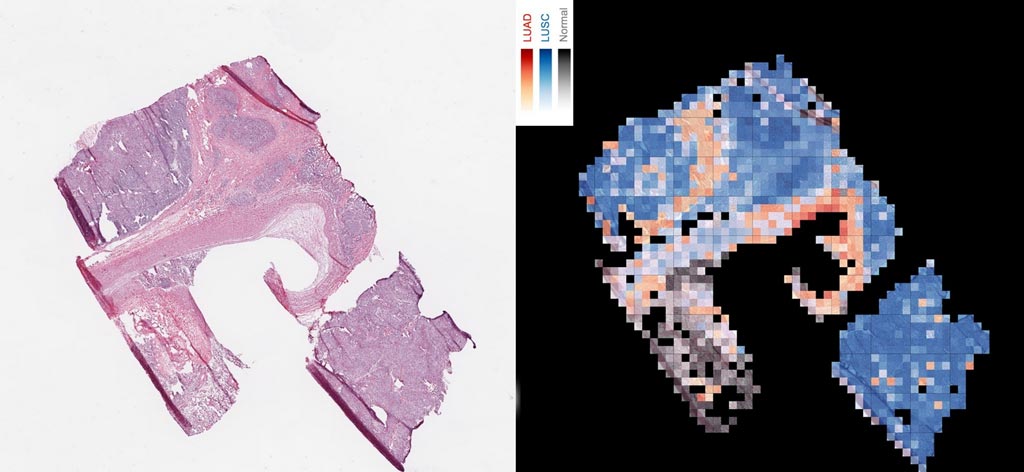AI Tool Identifies Cancer Type and Changes in Lung Tumor
By MedImaging International staff writers
Posted on 01 Oct 2018
Researchers from the NYU School of Medicine (New York City, NY, USA) have developed a new computer program that can analyze the images of patients' lung tumors, specify cancer types, and even identify altered genes driving abnormal cell growth. In their study, the researchers found that the artificial intelligence (AI), or "machine learning," program could distinguish -- with 97% accuracy -- between adenocarcinoma and squamous cell carcinoma, two lung cancer types that experienced pathologists at times struggle to parse without confirmatory tests. Additionally, the study found that the AI was also able to determine from analyzing the images whether the abnormal versions of six genes linked to lung cancer – including EGFR, KRAS and TP53 – were present in cells, with an accuracy ranging from 73% to 86%, depending upon the gene.Posted on 01 Oct 2018
For their study, the researchers designed statistical techniques that gave their program the ability to "learn" how to get better at a task, but without being told exactly how. Such programs build rules and mathematical models that enable decision-making based on data examples fed into them, with the program becoming "smarter" as the amount of training data grows.

Image: An AI tool analyzes a slice of cancerous tissue to create a map that tells apart two lung cancer types, with squamous cell carcinoma in red, lung squamous cell carcinoma in blue, and normal lung tissue in gray (Photo courtesy of Cision).
Newer AI approaches, inspired by nerve cell networks in the brain, use increasingly complex circuits to process information in layers, with each step feeding information into the next, and assigning more or less importance to each piece of information along the way. The researchers trained a deep convolutional neural network, Google's Inception v3, to analyze slide images obtained from The Cancer Genome Atlas, a database of images where cancer diagnoses had already been determined. This allowed the researchers to measure how well their program could be trained to accurately and automatically classify normal versus diseased tissue.
The study found that about half of the small percentage of tumor images misclassified by the study AI program was also misclassified by the pathologists, highlighting the difficulty in distinguishing between the two lung cancer types. On the other hand, 45 out of 54 of the images misclassified by at least one of the pathologists in the study were assigned to the correct cancer type by the machine-learning program, suggesting that AI could offer a useful second opinion.
The researchers now plan to continue training their AI program with data until it can determine which genes are mutated in a given cancer with more than 90% accuracy, after which they will begin seeking government approval to use the technology clinically, and in the diagnosis of several cancer types.
"Delaying the start of cancer treatment is never good," said senior study author Aristotelis Tsirigos, PhD, associate professor in the Department of Pathology at NYU School of Medicine and NYU Langone Health's Perlmutter Cancer Center. "Our study provides strong evidence that an AI approach will be able to instantly determine cancer subtype and mutational profile to get patients started on targeted therapies sooner."
"In our study, we were excited to improve on pathologist-level accuracies, and to show that AI can discover previously unknown patterns in the visible features of cancer cells and the tissues around them," said the study’s co-corresponding author Narges Razavian, PhD, assistant professor in the departments of Radiology and Population Health. "The synergy between data and computational power is creating unprecedented opportunities to improve both the practice and the science of medicine."
Related Links:
NYU School of Medicine














